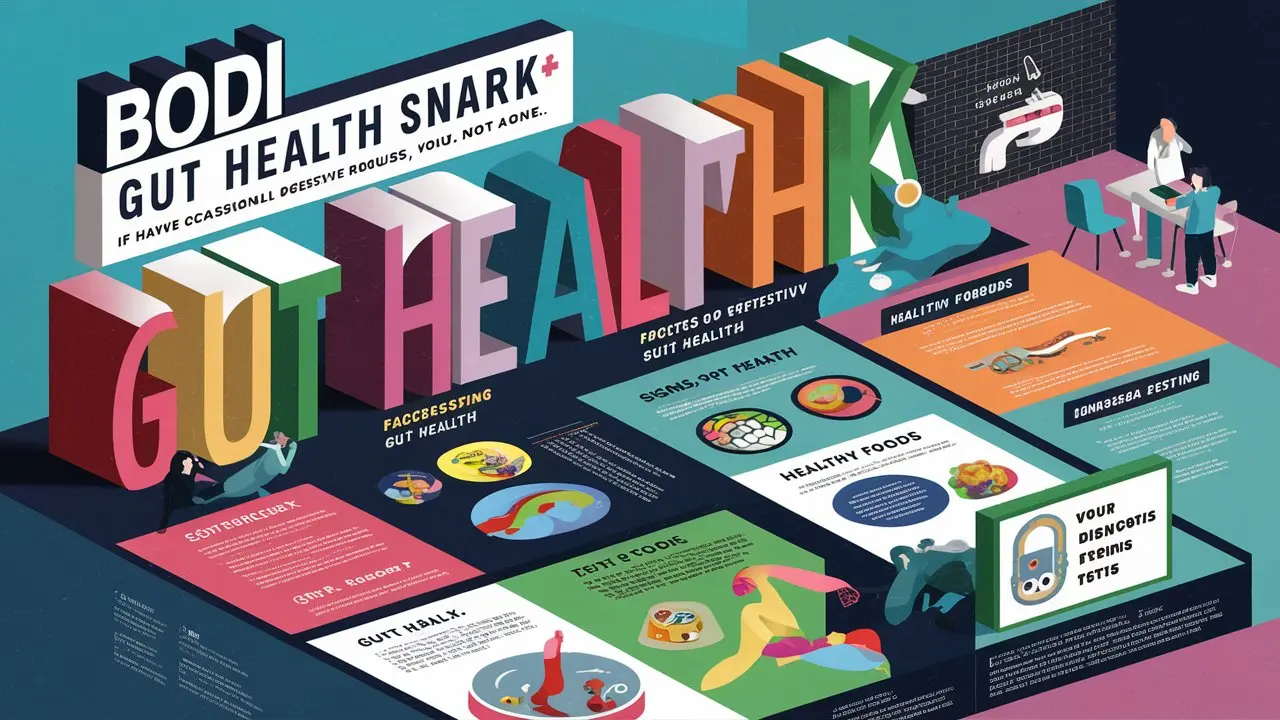If you have occasional digestive troubles, you are not alone. Bodi Gut Health Snark uses changes in diet, supplements, and lifestyle to improve gut bacteria, strengthen the immune system, and boost overall health.Everyday things like lifestyle changes, stress, and food cause occasional gut symptoms. here we will discuss gut health snark, factors affecting gut health, signs of poor health, healthy gut foods and diagnosis and testing.
what does bodily good health snark mean?
- This means talking about health and wellness in a funny way.
- Help peoples understand how to take care of their bodies in a simple and easy way
1. THE UNDERSTANDING OF GUT HEALTH
What is gut health?
The gut, also known as the gastrointestinal (GI) system, is responsible for digesting food, absorbing nutrients, and eliminating waste. Gut health is related to a healthy gut microbiome and limited digestive symptoms.
How can we determine gut health?
We can determine gut health by determining the amount and types of bacteria in the digestive tract, known as the gut microbiome. A healthy human gut contains trillions of bacteria, but some are
- Lactobacillus and Bifidobacterium: found in probiotics and yogurt, maintain a healthy digestive tract
- Prevotella is rich in foods like fruits and vegetables and low in meat. play a role in Glucose metabolism,Short-chain fatty acids and Immune system
- Ruminococcus breaks down complex polysaccharides.
- Bacteroides break down polysaccharides into metabolites like short-chain fatty acids (SCFAs) and amino acids.
- Firmicutes play a role in carbohydrate breakdown, butyrate production, bile acid metabolism, and anti-inflammatory effects.
- Peptostreptococcus promotes intestinal barrier function and reduces inflammation
- Clostridium plays a role Ferment nutrients, support digestion, reduce inflammation, strengthen the intestinal barrier, and support mental health.
All these bacteria play a fundamental role in gut health.
role of gut health for overall well-being
Gut health plays a crucial role in your digestion, immune system, mental health, and immunity. Some Researches suggests that improving the health of your gut can help you lose body weight
2. FACTORS AFFECTING THE GUT HEALTH
Diet and Nutrition
A fiber-, fruit-, and vegetable-rich diet promotes overall digestive and gut health. Here are some beneficial gut foods, like
- Rich-fiber foods: these are Legumes, whole grains, nuts, fruits, broccoli, and asparagus
- Garlic: promote gut microbiome diversity and improve gut health
- Foods rich in: Fiber, prebiotics, probiotics, polyphenols, and Omega-3 fatty acids
Stress and anxiety
- stress slows down digestion, causing bloating, pain and constipation.
- In some people, it speeds up, causing diarrhoea and frequent trips to the restroom.
- Stress can worsen digestive conditions by completely losing appetite.
- Some research shows that stress can change the composition of the gut microbiota, leading to poor gut health.
Environmental Toxins and pollution
Environmental toxins and pollution have the ability to change the gut microbiota composition and cause many disorders . these disorders effect nutrient absorption, energy metabolism, and immune system function and prevent gut bacteria from working. some environmental toxins are
- Pesticides
- Air pollution:
- Bisphenol A (BPA)
- Phthalates
- Arsenic
- Cadmium
- Chromium
- Mercury
- Lead
3. SIGNS OF POOR GUT HEALTH
a)♦Digestive issues
Digestive issues that can cause bloating, cramps, and diarrhea include:
1. bowel syndrome (IBS)
The most common long-term condition that affects the large intestine is constipation and gas. people can manage symptoms with diet, lifestyle changes, and stress relief.
2. cramps with bloating
caused by trapped wind inside the stomach.
3. Gastroenteritis
It is a viral or bacterial infection of the stomach and bowel that can cause sudden stomach cramps and diarrhea. It is caused by:
- close contact with an infected person
- by eating contaminated food
4. food intolerance
Common food intolerances include lactose intolerance, which causes issues in digesting dairy products, fructose and food additives.
5. Pancreatitis
Pancreas working disability causes IBS (irritable bowel syndrome). its symptoms are bloating, diarrhea, and belly pain.
b)♦ Fatigue and Low Energy
Poor gut health can lead to fatigue and low energy in a number of ways, including:
1. Inflammation
Unhealthy gut’s trigger the immune system to cause an inflammatory response. this response causes feelings of fatigue, tiredness, and exhaustion. this inflammation spreads to other organs, like the brain and thyroid, to reduce energy levels.
2. Sleep issues
Our unhealthy gut causes insomnia, and poor sleep may lead to fatigue. serotonin produced by the gut has an effect on mood and sleep.
3. Nutrient absorption
Guts play a vital role in absorption and energy production. Irregular gut function may lead to fatigue
c)♦ Skin Issues (Acne, Eczema, Rashes)
Poor gut health may be a sign of following conditions:
- Microbiome imbalances, bananas,
- Leaky Gut
- Neurotransmitter Production.
- Immune system response.
Skin Issues like
Acne’s: poor gut health promotes acne growth.
Eczema: is a chronic, non-contagious inflammatory skin condition which causes dry, itchy, and inflamed skin
Rosacea: pylori infection in the stomach mucosa and small intestinal bacterial overgrowth triggers an inflammatory response, causing facial redness.
BEST GUT FRIENDLY FOODS
1. Fiber-Rich Foods (Fruits, Vegetables, and Grains)
- Fruits: apples, pears,Avocados, Raspberries, Oranges, bananas, and guavas.
- Vegetables: Artichokes, potatoes, Brussels sprouts, cauliflower, broccoli, beetroot, cauliflower, bitter gourd, Eggplant, Collard Greens, and Swiss chard
- Grains: Oatmeal and Brown rice
2. Probiotic-Rich Foods (Yogurt, Kefir, and Vegetables)
- Omega-3-rich foods
- fatty fish
- flax seeds
- nuts and chia seeds
- Plant foods
DIAGNOSIS AND TESTING
1). Gut health tests
Gut health tests, also termed gut microbiome tests, consist of the following three tests:
2). Stool Tests
This test is used to diagnose digestive problems like parasitic infections, H. pylori, and cancer. We have found stool tests for abnormal bacteria, inflammation, pancreatic dysfunction, and non-bacterial infections
3). Blood Tests
This test measure the amount of pancreatic enzyme,Conditions of bowel disease, and nutritional deficiencies
Tips for Maintaining a Healthy Gut
- incorporating probiotic-rich foods like yogurt and kimchi into your diet to promote healthy gut bacteria.
- Prioritize getting ample sleep and reducing stress through mindfulness practices to support optimal digestion.
- Additionally, consider reducing your intake of gut irritants like processed foods and artificial sweeteners.
- Remember, small changes in your daily routine can have a significant impact on your gut health.
Exercise and Physical Activity
- Exercise can increase the number and diversity of gut bacteria.
- It improves blood circulation throughout the body, which helps the digestive tract function properly.
- It increases antioxidant levels and improves immune function. this helps to reduce the risk of inflammatory bowel disease and colon cancer.
- Exercise reduces insulin levels and prevents tumor cell growth in the microbiome.
- Managing Stress by Meditation, Yoga, and Deep Breathing
How are gut health and weight linked together?
Some researchers have found that gut health is closely related to weight loss. They said that obese people have a smaller range of gut bugs than moderate-weight people. on the other hand, gut microbiota can affect both energy balance and metabolic function, leading to weight gain and obesity.
CONCLUSION
the health of our gut plays a crucial role in maintaining overall well-being. By prioritizing nutrition that supports a diverse and healthy gut microbiome, we can enhance our digestion, strengthen our immune system, and protect against various health conditions. Making mindful dietary choices and incorporating gut-friendly foods into our daily routine can contribute to a healthier and happier life.

